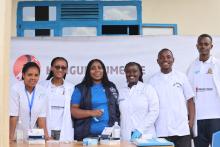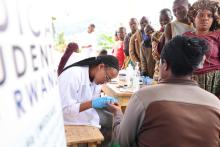WHO joins forces with medical students to improve health and well-being of adolescents and communities
It is a bustling morning at the Nyabahinga market, in Burera District in Rwanda. The place is alive with music blasting and loud voices of sellers calling for customers and haggling prices. In a distinct quiet corner, a simple table stands out, manned by young people dressed in white lab coats. Curiosity draws one person after another to find out who these people are until the music is suddenly interrupted.
"Good morning residents of Nyabahinga. We are the Medical Students’ Association of Rwanda, and we are offering free screening for blood pressure, blood sugar, BMI, and HIV, along with counseling services on family planning and mental health." By the time Emmanuel Bizimana, President of MEDSAR finishes his introduction, the corner is already filled with long queues of young people, mothers, and fathers, lining up for the just-advertised free screening.
In Rwanda, non-communicable diseases (NCDs) are increasingly becoming a major burden on the health system. The Nationwide Non-Communicable Diseases STEPwise survey 2021 revealed that 16.2% of Rwandans have high blood pressure. The Rwanda Biomedical Centre (RBC) further estimates that out of over one million people estimated to be living with high blood pressure, only 80,000 are enrolled in clinics, revealing a gap between diagnosis and treatment. To address these challenges, MEDSAR developed the "Kanguka Umenye'' project, aiming to improve the overall health and well-being of communities in some of the most remote areas. With support from World Health Organization, RBC and other health partners, the project reached over 23,000 people across Kayonza, Kirehe and Burera districts, providing NCD screening and family planning services to more than 12,000 individuals. From 6 May to 16 May 2024, the campaign targeted sites where the public usually congregates, such as markets and schools.
In the afternoon, after a long 2-hour drive on unpaved roads, we arrived at another "MEDSAR site", at Kirambo Market, in Burera District. Abound twenty residents are queuing to get free screening and family planning services.
"I was walking around the market and discovered they were giving free HIV and NCD screening,” said Rugamba David, a young man who had just received the results of his test results. “I decided to line up too because I have always wanted to know my status, but I was not sure how to access the services from the hospital. As a young man, I find it difficult to go to the hospital if I am not feeling sick, especially since I am uncertain whether my health insurance covers such tests. Now, I am happy I know my status."
A team of 90 MEDSAR members was deployed over the ten days across 42 sites centers, in collaboration with 20 health professionals who provided guidance and support.
"These outreach screenings are crucial," said Janvier Habiyakare, a nurse at Burera Hospital supporting the initiative on the ground. "Hospitals struggle to conduct them without disrupting regular services, and communities often hesitate to come in for checkups. This initiative is vital for both public health and improving health indicators."
Recognizing the critical role of youth people, WHO invests in youth-led organizations like MEDSAR to help them develop into holistic professionals by the time they graduate through such experiences contributing to promoting health and preventing diseases.
"WHO's support was vital in the success of the health camp by providing resources, expertise, and collaboration. Their support improved service delivery of comprehensive healthcare and helped mitigate challenges such as material shortages and logistical barriers. Thanks to WHO, we effectively executed the project and promoted a holistic healthcare approach, by addressing diverse health needs simultaneously." says Emmanuel Bizimana, President of MEDSAR.
Through financial and technical support to the "Kanguka Umenye" initiative, WHO Rwanda empowered MEDSAR to conduct the community screening and counseling services.
“WHO Rwanda is committed to empowering young people through youth-led organizations like MEDSAR. Through capacity building, mentorship and motivation to contribute to their communities when they are still medical students, they will be inspired to be holistic healthcare professionals by the time they graduate. They will then be doctors who have the welfare of their patients at heart, especially the most vulnerable and those residing in remote areas, and will be able to significantly contribute to Health for All in Rwanda.” said WHO Rwanda Representative Dr Brian Chirombo.

